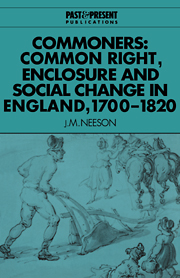Book contents
1 - The question of value
Published online by Cambridge University Press: 01 February 2010
Summary
… the true interest of a nation, the authority of government, and the liberties and property of the subject, are all best established and promoted, by keeping things in a state in which the bulk of the people may support themselves and their families.
An Enquiry into the Reasons for and against Inclosing the Open Fields Humbly Submitted to All Who have Property in them, and Especially the Members of the British legislature (Coventry, 1767), pp. 5–6… the province of ninety-nine out of an hundred was to receive, not to give orders.
John Clark, General View of the Agriculture of the County of Hereford with observations on the Means of its Improvement (1794), p. 75.From the fifteenth century to the nineteenth, evaluations of common right were inseparable from the larger question of enclosure and the engrossment of small farms. For enclosure meant the extinction of common right and the extinction of common right meant the decline of small farms: ‘Strip the small farms of the benefit of the commons’, wrote one observer, ‘and they are all at one stroke levelled to the ground.’ Disagreement about the value of common right has always been a debate within this debate. In our own century it is as part of the same argument that the quarrel continues between historians. If I begin with them it is not because they have the most to say about common right but because increasingly they have chosen to say the least and in so choosing they have misunderstood the full meaning, the real value, of common right.
- Type
- Chapter
- Information
- CommonersCommon Right, Enclosure and Social Change in England, 1700–1820, pp. 15 - 52Publisher: Cambridge University PressPrint publication year: 1993

